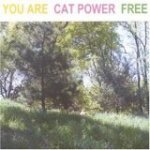
Cat Power You Are Free
(Matador)
Last time we heard from Chan Marshall, the insanely talented songstress behind Cat Power, she was peddling an album comprised almost entirely of covers. A nice idea wouldn't you agree? Maybe, but a proportion of Marshall's fanbase were justifiably desperate to hear a true follow-up to 1998's sublime Moon Pix, and greeted The Covers Record with screams of "cop-out!" Consequently, the album failed to match its predecessor's success, and Marshall headed into the hills to finally commence work on some fresh material. Three years later, and Moon Pix's rightful heir has finally arrived. Ladies and gentleman, brace yourselves for You Are Free, a genuine contender for album of the year.
Now I'm fully aware that my last statement was bold in nature but you'll have to trust me when I say that I've thought this one through. You Are Free has been sitting in my stereo uninterrupted for over a month now, and as I continue to lap up tracks like Free, He War, and the beautifully fragile cover of John Lee Hooker's Keep on Runnin', it's clear (to me at least) that Chan Marshall has truly delivered the goods this time round.
Although You Are Free's press has on the whole been overwhelmingly positive, a handful of writers have pointed the finger of criticism towards the album's sparsely instrumented midsection and its downbeat finale. I'll freely admit that my initial reaction to tracks like Shaking Paper and Evolution was one of indifference, but repeated listening has prompted a dramatic turnaround in my views. I'm finally beginning to divert my ears away from the obvious brilliance of say, I Don't Blame You, in favour of slow-burning gems like the delicate cover of Michael Hurley's Werewolf and the simple-yet-eerie Baby Doll. Perhaps if these ever-complaining critics had afforded You Are Free the attention it so obviously deserves then they might have succeeded in discovering the beauty contained within these apparently "sluggish" and "lightweight" songs?
Anyway, let's forget about criticism for a moment and talk about some of the album's other highlights. The sombre ballad Names deserves a mention as the darkest track on the album. A tender ode to lost friends, among them victims of child abuse and rape, Marshall delivers the vocal with a touching sincerity, her voice tinged with sorrow. It's uneasy listening of course, but at the same time, undeniably beautiful. Good Woman however, goes one better. Another slice of classic Marshall songwriting, this emotionally charged ballad details the imminent demise of a deeply cherished relationship and the result is undeniably You Are Free's finest moment. Violins weep as Marshall confesses "I will miss your heart so tender / and I will love this love forever" and even a mumbling backing vocal from Eddie Vedder can't destroy the sheer beauty of it all.
Ok. Now I think I've outlined my views in an adequate manner but I know you people are also in search of a definitive conclusion. So, for those people who are a) slow on the uptake, or b) too lazy to read the rest of the review, here is my final verdict: You Are Free is a masterful record, possibly the best I've heard so far in 2003. It deserves a place in any collection. Go and buy it now.
20 March, 2003 - 00:00 — David Coleman